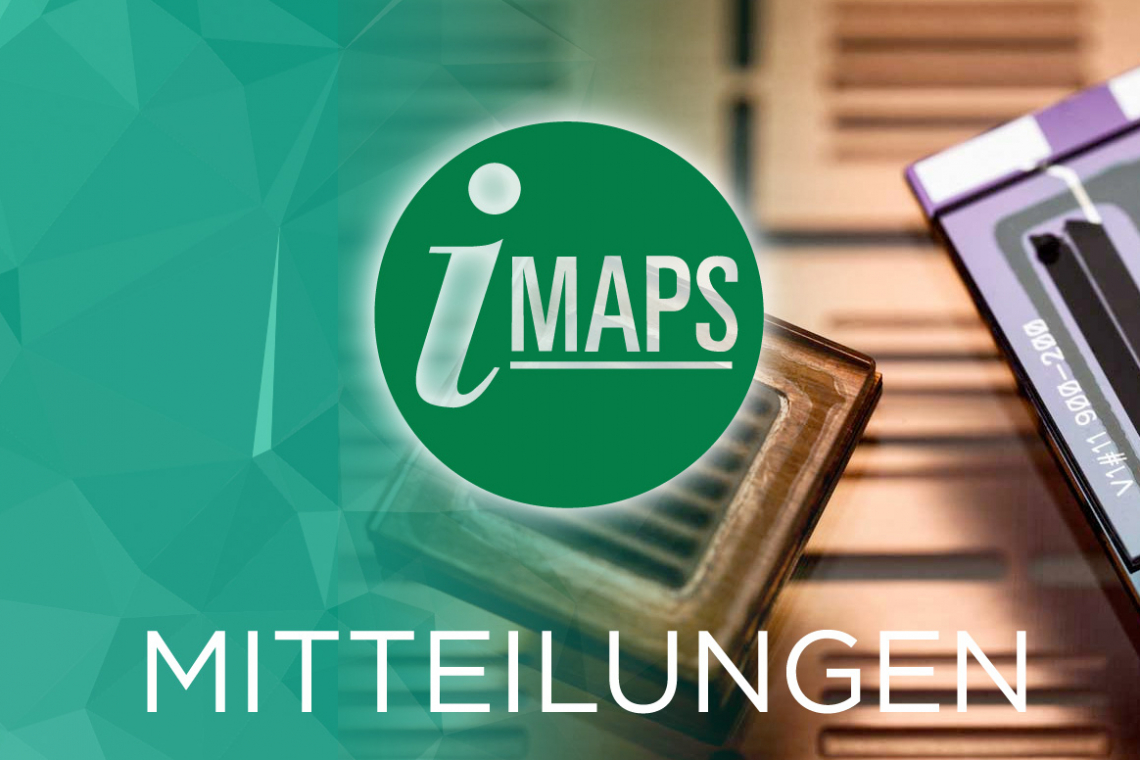Foreword
Dear iMAPS members, dear readers,
In issue 08/23 of the magazine PLUS, Produktion von Leiterplatten und Systemen, you already had the opportunity to read an article published by Solderpunk e.V. on the subject of "Sustainability in electronics". This is a topic that affects us all and will become much more important in the future in terms of product development (service life), use (energy efficiency) and disposal (separation of raw materials by type). This makes it all the more important for us as an association to bring this article to your attention. But to say it up front - we were too hasty as a press team. IMAPS pools opinions, supports the formation of opinion within the profession and gives weight to those responsible for making decisions on an objective basis. And as fast-moving as our times are, we are increasingly gaining new and in-depth insights that unfortunately could not be taken into account and elaborated on in the previous article. We are therefore taking this opportunity to provide you with further insight into the subject matter in this version, which has been updated by our partner. We hope that this will fulfill our information mandate.
Definition: Sustainability in electronics / Solderpunks association for more sustainable electronics
 To get in the mood for writing this text, I skimmed through some articles in electronics journals. The search criteria for the articles were words such as "ecological, social, fair" and, of course, "sustainability". A word whose range of meaning, similar to Moore's Law, is increasing and thus sinking more and more into meaninglessness. As a reminder: the origin of the word comes from forestry: only those who fell as many trees as can grow back ensure that the forest is available for future use and retains its value in the long term.
To get in the mood for writing this text, I skimmed through some articles in electronics journals. The search criteria for the articles were words such as "ecological, social, fair" and, of course, "sustainability". A word whose range of meaning, similar to Moore's Law, is increasing and thus sinking more and more into meaninglessness. As a reminder: the origin of the word comes from forestry: only those who fell as many trees as can grow back ensure that the forest is available for future use and retains its value in the long term.
You may be smiling now, as it is of course incredibly difficult to draw a comparison between this definition and the electronics industry. Perhaps this is where the problem lies. Reading the articles, I was struck by the one-size-fits-all approach, which is made up of the uncritical sufficiency of current political implementations and the patting on the back of the industry, which too often believes that it has recognized the ecological and social problems and has exhausted its scope for action. Why are acute, threatening, ecological and social problems not understood enough? Surely this is the first step towards making appropriate demands on politicians!
In the struggle for security of supply and resilience, the greatest challenge of our time is being pushed further and further into the background. Of the nine ecological limits, the most prominent is climate change!
The climate catastrophe, in the face of which all the other challenges are a pretense. It is not just another problem on the stage, alongside dependencies on China or the security of supply of critical raw materials. The climate catastrophe threatens the stage itself! If you think this statement is an exaggeration, I urge you to finally get to grips with the issue and at least read the summary of the latest IPCC report for decision-makers. Compliance with the Paris Climate Agreement is not a concession to ecosystems, nor is it an end in itself. It is a compromise that is binding under international law and is intended to curb the destruction of our human livelihoods. And this is another point where misunderstandings often arise. The 1.5 °C is already the compromise that the world's governments agreed on for a reason. Implementation is complex and therefore not just the task of politicians, but of society as a whole.
The electronics industry has a special role to play as a beacon of hope for decarbonization. This is because the politically presented solutions lie in particular in the energy transition, mobility transition and digitalization transition. I feel there is a lack of reflected and critical participation here. We need to become climate-neutral as quickly as possible, not just by 2050. This requires sustainability strategies:
- Efficiency
produce better, same benefits - less energy consumption - Consistency
produce differently, with renewable energies or recyclable materials - Sufficiency
produce and consume less, limit energy and material consumption.
To endCO2 emissions as quickly as possible, we need all three strategies. I have not yet come across sufficiency in our discussions. Consistency is dominating the current discussion. We are in the middle of implementation, but far too slowly. Here are a few facts about recycling:
1. more than 50 million tons of electronic waste are generated worldwide
Although China is nominally in first place worldwide with 10 million tons of electronic waste, its 7.2 kg per inhabitant is far from the top position in an international comparison. The leader is Norway with 57 kg of electronic waste per capita, followed by the UK with 55 kg. This makes electronic waste the fastest growing waste stream in the world.
Experts predict that a total of 75 million tons of electronic waste will be generated worldwide by 2030.
2 In Germany, each person produces 20 kg of e-waste per year
In the last 10 years, the amount of e-waste placed on the market in Germany has increased by a total of 1.1 million tons. The trend is rising and this quantity is not expected to fall significantly.
3. the recycling rate in Germany is now only 39%
The collection rate for e-waste published by Destatis in March 2023 is only 39% for 2021, although the legal requirement is 65%. This means that the rate has fallen by a further 5% compared to the previous year. One of the main reasons why the collection rates for e-waste are so low is the low commitment of retailers to taking back old electrical appliances.
4. more than 50 % of e-waste is large household appliances
IT telecommunication devices, small electrical appliances and entertainment devices make up the rest. According to the Federal Environment Agency, the useful life of large electrical appliances was reduced by one year to 13 years between 2004 and 2012. According to the study, the proportion of appliances that had to be replaced within five years due to a defect has risen sharply from 3.5% to 8.3%.
5. 200 million cell phones lie unused in German drawers
Extrapolated, this amounts to 50 tons of silver, almost 5 tons of gold, 1.8 tons of palladium and 650 tons of copper. To mine 650 tons of copper, you need 100,000 tons of copper ore!
I talk to great people from the electronics industry who want to be part of a change that is urgently needed. It is a mammoth task, but we are many, well educated and keen to tackle challenging tasks if they make sense. What could be more meaningful than facing up to the challenges of planetary boundaries? The traffic turnaround camp is currently taking place in Wolfsburg. I find the idea of turning the Autostadt into a traffic turnaround city very charming. There's no need to change the initials.
Take a look at what's going on and get involved, for example by spreading the word:
Newsletter at www.solderpunks.com.
SOLDERPUNKS
solder.punks
Solderpunks e.V.
Invitation for spontaneous participants! IMAPS Fall Conference 19./20.10.2023
Come to Munich for the annual fall conference of IMAPS Germany. Meet representatives from the fields of microelectronics and related packaging. Experts from both industry and research will be present to exchange specialist information, initiate joint work or develop future project ideas. Exchange ideas and take the opportunity to discuss the latest trends and current research priorities with representatives from the individual universities. The program includes interesting presentations on the following topics:
- Design, modeling, simulation
- System integration technologies
- Materials and processes
- Quality and reliability
We look forward to your visit!
You can find more information about the program on our website:
https://imaps.de
or directly at:
https://www.conftool.net/imaps-herbstkonferenz-2023/sessions.php
Calendar of events
|
Venue |
Period |
Event name |
Organizer |
|
Łańcut near Rzeszów |
Sep 24 - 27, 2023 |
45th IMAPS Poland Conference |
IMAPS Poland |
|
San Diego |
Oct. 02 - 05, 2023 |
56th International Symposium on Microelectronics |
IMAPS US |
|
Munich, Germany |
Oct. 19 / 20, 2023 |
IMAPS Germany Fall Conference |
IMAPS DE |
|
Munich, Germany |
Nov. 14 - 17, 2023 |
SEMICON EUROPE |
SEMI Europe |
|
Fellbach |
05 - 06 Mar. 2024 |
EBL 2024 |
IMAPS Germany - Your association for packaging and packaging technology
IMAPS Germany, part of the International Microelectronics and Packaging Society (IMAPS), has been the forum in Germany for all those involved in microelectronics and packaging technology since 1973. With almost 300 members, we essentially pursue three important goals:
- we connect science and practice
- we ensure the exchange of information among our members and
- we represent the position of our members in international committees.
Imprint
IMAPS Germany e. V.
Kleingrötzing 1, D-84494 Neumarkt-St. Veit
1st Chairman: Prof. Dr.-Ing. Martin Schneider-Ramelow, Acting Director of the Fraunhofer Institute for Reliability and Microintegration (IZM),
Treasurer
(for questions about membership and contributions):
Ernst G. M. Eggelaar,
You can find detailed contact information for the members of the Executive Board at www.imaps.de
(Executive Board)


